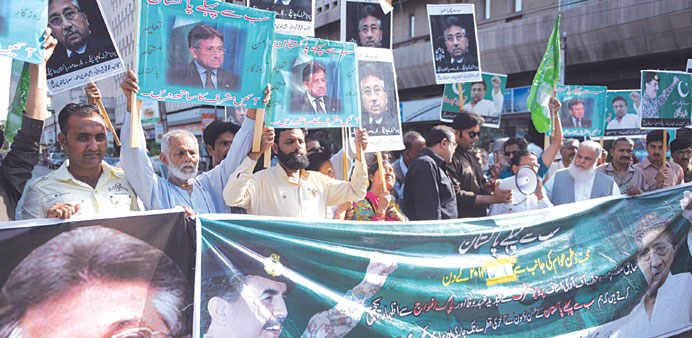Internews/Islamabad
Millions of rupees are being spent on building a security wall around the farmhouse of former president retired Gen Pervez Musharraf in Chak Shahzad to ensure his safety.
According to sources, the interior ministry had sought recommendations from various departments concerned about the security arrangements around the farmhouse.
Officials of police, the interior ministry and the Capital Development Authority said it had been suggested that the wall should be built around the farmhouse, as had been done for the embassies and foreign missions.
The officials said the step had been taken after a number of influential people, including legislators and bureaucrats living in Chak Shahzad complained of inconvenience because of the security arrangements.
A police officer said the legislators and bureaucrats disliked search of their vehicles and saw it as a breach of privilege.
In the last week of February, the ministry approved construction of the wall “as soon as possible” and issued directives to the CDA, the officials said.
In reply, the CDA approached the inspector general of Islamabad police and asked him to issue a recommendation for building the wall.
The CDA started erecting the wall after bringing in about a dozen concrete blocks that were 12-foot high, five-foot wide and six-inch thick. Cranes and other machinery were also brought in to place the blocks around the farmhouse in the form of a wall.
A CDA official said the wall would be erected at the front and on both sides of the premises within two weeks. “It will be a concrete wall with steel rods that can absorb shock of more than 50kg of explosives.”
The police officer said the wall would help avoid human error in the security arrangements and also reduce the manpower required at the place.
“It will help avert penetration into the farmhouse by scaling its walls, besides explosive attacks from the sides, especially after sunset.”
He said 198 police personnel were posted around the farmhouse and the Park Road, along with 105 personnel of Rangers. Seven police pickets and eight vehicles patrol the area round the clock.
“The number of security personnel and pickets is likely to come down by about 50% after completion of the wall,” he added.
On March 10, the interior ministry issued an alert that Musharraf might be assassinated by militants from the banned Tehreek-i-Taliban Pakistan and Al Qaeda. It warned that the militants might succeed in penetrating the security of the former president.
“It seems that terrorists have sympathisers in the security detail of General (R) Pervez Musharraf,” the alert said, adding that “the plan may materialise either en route, using IED and VBIED (vehicle-borne improvised explosive device), or inside/outside the courts,” similar to the
assassination plot for former Punjab governor Salman Taseer.
Keeping in view the threat, it was suspected that guards of the former ruler or security personnel deployed with him might assassinate him, as a guard of the governor had done.
Islamabad police, Rangers and former army officers were providing security to Musharraf and personnel from the armed forces also had a role, a police officer said.
The officials said the police personnel were not allowed near Musharraf and his personal guards - retired army officers who had been performing the duty with him since he was the chief of army staff and president.
Only senior officers like a senior superintendent of police or SP interact with him.

Supporters of Pervez Musharraf shout slogans during a protest in Karachi yesterday.
